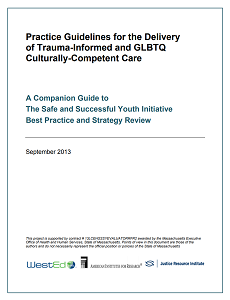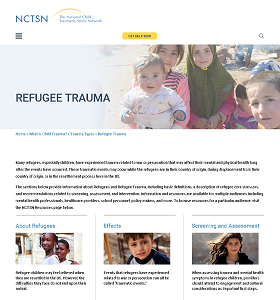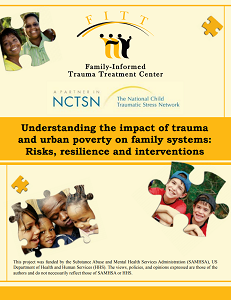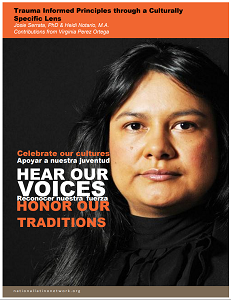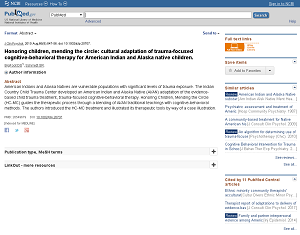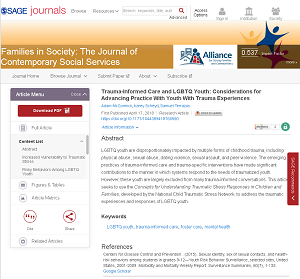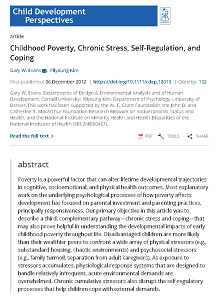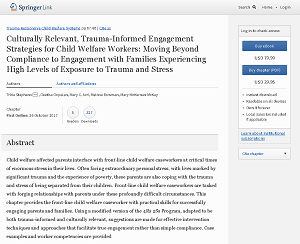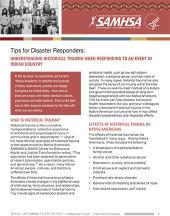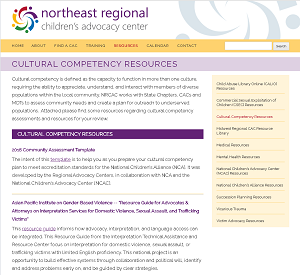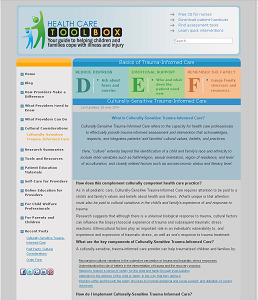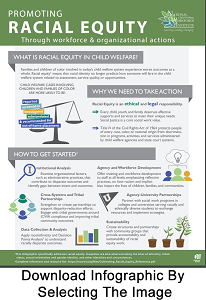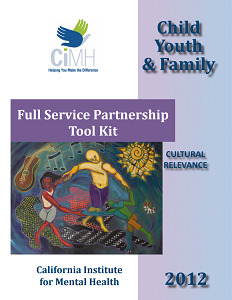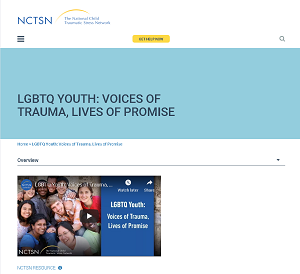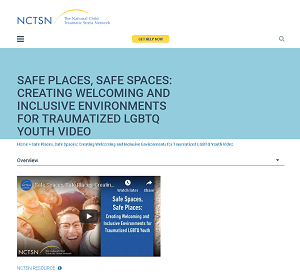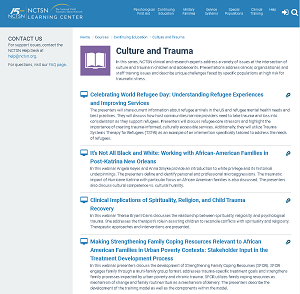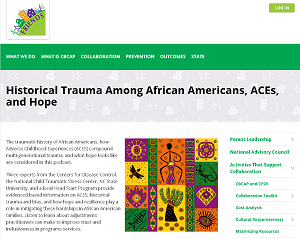-
Practice Guidelines for the Delivery of Trauma-Informed and LGBTQ Culturally-Competent Care
Culture, Diversity, & Trauma
The American Institute for Research (AIR) in partnership with the Justice Resource Institute (JRI)GeneralThis companion guide to the SSYI Best Practice and Strategy Review highlights several practice issues related to serving youth impacted by trauma and/or dealing with issues of sexual orientation and gender identity
-
Refugee Trauma
Culture, Diversity, & Trauma
National Child Traumatic Stress Network (NCTSN)GeneralThis webpage from the NCTSN provides a wealth of information on screening and assessment, interventions, and resources for refugee populations.
-
Understanding the impact of trauma and urban poverty on family systems: Risk, resilience and interventions
Culture, Diversity, & Trauma
National Child Traumatic Stress Network (NCTSN)GeneralThis white paper summarizes clinical and research findings on the impact of trauma in the context of urban poverty. It discusses the impact of trauma and urban poverty on children, adolescents, family members, and familial relationships.
-
Trauma Informed Principles through a Culturally Specific Lens
Culture, Diversity, & Trauma
National Latino NetworkGeneralThis document defines the core principles of trauma informed work through a culturally specific analysis, and seeks to provide practitioners with accessible language to describe the trauma informed/culturally specific overlap of their work.
-
Honoring Children, Mending the Circle: Cultural Adaptation of Trauma-Focused Cognitive-Behavioral Therapy for American Indian and Alaska Natives
Culture, Diversity, & Trauma
Journal of Clinical PsychologyBehavioral HealthThis article explores the cultural adaptation of evidence-based child trauma treatment and trauma-focused cognitive-behavioral therapy by the Indian Country Child Trauma Center .
-
Trauma-Informed Care and LGBTQ Youth: Considerations for Advancing Practice with Youth with Trauma Experiences
Culture, Diversity, & Trauma
Journal of Contemporary Social ServicesGeneralThere is a fee to access the full article. This article references the Concepts for Understanding Traumatic Stress Responses in Children and Families - developed by the National Child Traumatic Stress Network - to address the traumatic experiences and responses of LGBTQ youth .
-
Childhood poverty, chronic stress, self-regulation, and coping
Culture, Diversity, & Trauma
Child Development PerspectivesGeneralThere is a fee to access the full article. This article highlights the impact of chronic stress and coping on child development amongst disadvantaged children.
-
Conceptualizing a Trauma Informed Child Welfare System for Indian Country
Culture, Diversity, & Trauma
Journal of Family StrengthsGeneralThere is a fee to access the full article. This article proposes a conceptual framework for creating trauma-informed systems that use evidence-based, culture. Generally competent information for trauma impacted youth in Indian County.
-
Facts matter! Black lives matter! The trauma of racism
Culture, Diversity, & Trauma
The McSilver Institute for Poverty Policy and Research, New York University Silver School of Social Work.GeneralThis document discusses the trauma of racism and systemic racial oppression. It provides a summary of select research on the blocked opportunities and oppressive burden that young men of color experience and offers promising policy and program solutions.
-
Culturally Relevant, Trauma-Informed Engagement Strategies for Child Welfare Workers: Moving Beyond Compliance to Engagement with Families Experiencing High Levels of Exposure to Trauma and Stress
Culture, Diversity, & Trauma
Trauma Responsive Child Welfare SystemsChild WelfareThere is a fee to access the full article. This chapter discusses tools frontline caseworkers can use to engage child-welfare affected caregivers.
-
Understanding Historical Trauma When Responding to an Event in Indian Country
Culture, Diversity, & Trauma
Substance Abuse and Mental Health Service Administration (SAMHSA)GeneralThis tip sheet discusses the concept and importance of historical trauma and its impact on Native American populations. Offers tips for preparing to respond to a disaster or other traumatic events in Indian Country.
-
Cultural Competency Resources
Culture, Diversity, & Trauma
Northeast Regional Children’s Advocacy CenterGeneralThis website provides resources on cultural competence in child abuse and neglect, tribal resources, and resources for children with disabilities and LGBTQIA youth.
-
Cultural Competency Resources
Culture, Diversity, & Trauma
Northeast Regional Children’s Advocacy CenterGeneralThis website provides resources on cultural competence in child abuse and neglect, tribal resources, and resources for children with disabilities and LGBTQIA youth.
-
Culturally -Sensitive Trauma Informed Care
Culture, Diversity, & Trauma
Health Care Tool BoxGeneralThis website offers information on Culturally-sensitive trauma-informed care and implementation considerations for health care professionals.
-
Racial Equity
Culture, Diversity, & Trauma
National Child Welfare Workforce InstituteChild WelfareThis website provides resources that support child welfare staff and leaders in confronting racial equity. This website contains tools, guides, assessments, and curricula on culturally responsive child welfare practices.
-
Full Service Partnership Toolkit: Cultural Relevance
Culture, Diversity, & Trauma
California Institute for Mental HealthBehavioral HealthThis toolkit presents guidelines and practice tools to assist counties and providers in improving the quality and access to care for underserved ethnic and cultural groups. Domains discussed include multicultural knowledge, addressing barriers to care, cultural self-awareness, sociocultural diversities, and specific practices and interventions.
-
Cultural Competency Resources
Culture, Diversity, & Trauma
Northeast Regional Children’s Advocacy CenterGeneralThis website provides resources on cultural competence in child abuse and neglect, tribal resources, and resources for children with disabilities and LGBTQIA youth.
-
Culturally -Sensitive Trauma Informed Care
Culture, Diversity, & Trauma
Health Care Tool BoxGeneralThis website offers information on Culturally-sensitive trauma-informed care and implementation considerations for health care professionals.
-
Racial Equity
Culture, Diversity, & Trauma
National Child Welfare Workforce InstituteChild WelfareThis website provides resources that support child welfare staff and leaders in confronting racial equity. This website contains tools, guides, assessments, and curricula on culturally responsive child welfare practices.
-
Full Service Partnership Toolkit: Cultural Relevance
Culture, Diversity, & Trauma
California Institute for Mental HealthBehavioral HealthThis toolkit presents guidelines and practice tools to assist counties and providers in improving the quality and access to care for underserved ethnic and cultural groups. Domains discussed include multicultural knowledge, addressing barriers to care, cultural self-awareness, sociocultural diversities, and specific practices and interventions.
-
LGBTQ Youth: Voices of Trauma, Lives of Promise
Culture, Diversity, & Trauma
National Child Traumatic Stress Network (NCTSN)GeneralThis 13-minute video features five LGBTQ youth who discuss details of their own trauma experiences related to their respective LGBTQ identities, how they gained resilience, and how professionals helped them in this regard.
-
Safe Places. Safe Spaces: Creating Welcoming & Inclusive Environments for Traumatized LGBTQ Youth
Culture, Diversity, & Trauma
National Child Traumatic Stress Network (NCTSN)GeneralThe video introduces the viewer to the needs of Lesbian, Gay, Bisexual, Transgender and Questioning (LGBTQ) youth who have experienced trauma.
-
Culture and Trauma
Culture, Diversity, & Trauma
National Child Traumatic Stress Network (NCTSN)GeneralThis section of the NCTSN website provides a series of archived webinars dedicated to a variety of issues at the intersection of culture and trauma in children and adolescents. Accessing this resource requires a free registration at https://learn.nctsn.org/. Once you have a registration and are signed on you can either use the link on this page or search the name of the resource on the NCTSN Learning Center website to access this resource.
-
Historical Trauma in American Indian and Alaska Native Tribal Nations
Culture, Diversity, & Trauma
Indian Health ServicesGeneralThis website provides a series of webinars on historical trauma and trauma informed care in Indian Country.
-
Historical Trauma Among African Americans, ACEs, and Hope
Culture, Diversity, & Trauma
Family Resource Information, Education, and Network Development Service (FRIENDS)GeneralIn this podcast three experts from the Centers for Disease Control and Prevention, the National Child Traumatic Stress Center, NC State University, and a local Head Start Program provide evidenced-based information on ACES, historical trauma and bias, and how hope and resilience play a role in mitigating these hardships in African American families.
-
LGBTQ Youth: Voices of Trauma, Lives of Promise
Culture, Diversity, & Trauma
National Child Traumatic Stress Network (NCTSN)GeneralThis 13-minute video features five LGBTQ youth who discuss details of their own trauma experiences related to their respective LGBTQ identities, how they gained resilience, and how professionals helped them in this regard.
-
Safe Places. Safe Spaces: Creating Welcoming & Inclusive Environments for Traumatized LGBTQ Youth
Culture, Diversity, & Trauma
National Child Traumatic Stress Network (NCTSN)GeneralThe video introduces the viewer to the needs of Lesbian, Gay, Bisexual, Transgender and Questioning (LGBTQ) youth who have experienced trauma.
-
Culture and Trauma
Culture, Diversity, & Trauma
National Child Traumatic Stress Network (NCTSN)GeneralThis section of the NCTSN website provides a series of archived webinars dedicated to a variety of issues at the intersection of culture and trauma in children and adolescents. Accessing this resource requires a free registration at https://learn.nctsn.org/. Once you have a registration and are signed on you can either use the link on this page or search the name of the resource on the NCTSN Learning Center website to access this resource.
-
Historical Trauma in American Indian and Alaska Native Tribal Nations
Culture, Diversity, & Trauma
Indian Health ServicesGeneralThis website provides a series of webinars on historical trauma and trauma informed care in Indian Country.
-
Historical Trauma Among African Americans, ACEs, and Hope
Culture, Diversity, & Trauma
Family Resource Information, Education, and Network Development Service (FRIENDS)GeneralIn this podcast three experts from the Centers for Disease Control and Prevention, the National Child Traumatic Stress Center, NC State University, and a local Head Start Program provide evidenced-based information on ACES, historical trauma and bias, and how hope and resilience play a role in mitigating these hardships in African American families.
